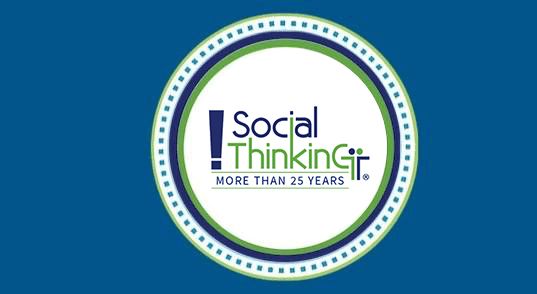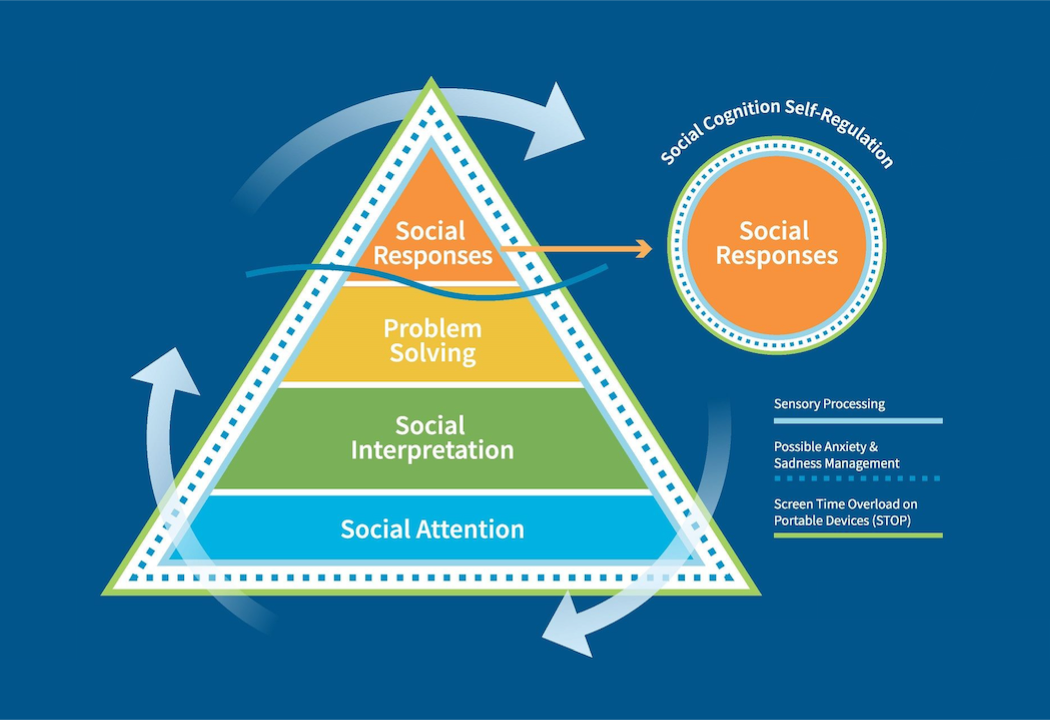What is Social Thinking 2.0?
After 27+ years, we now know that Social Thinking is still in its infancy (or early childhood) because there are so many current pathways to nurture and new ones to blaze. We hope you’ll walk away with the idea that Social Thinking concepts are relevant across all neurotypes. In the early years, the autism and special education communities were the only populations to embrace our work. Now, as we move past the pandemic, reflect on the neurodiversity movement, and heed the research related to the academic, social, and organizational needs of all children, we find our work is found more often in Tier 1 classrooms, homeschools, private schools, or in smaller groups of students, whether considered neurotypical or neurodivergent. In other words, all students need tools to think socially for both academic and social worlds.
So, at our core we still remain committed to supporting people who seek tools and strategies to make gains toward their social goals, regardless of whether they have a diagnosis or not. We have new ways of talking and writing about what we do, so if you are looking for a way to explain the core of the Social Thinking® Methodology, here is an infographic that might help.

Social Thinking 2.0 emphasizes:
Learner led: Teaching begins with the individual and their goals. The lessons are based on the perspective and goals of the individual. It is never about fixing a person but rather giving individuals tools to meet their goals. We also need to educate others about learning systems and differences. Always be a learner first—understand the individual and their perspective before launching into the role as educator or therapist. Also, empower your students to be leaders, peer supporters, includers, advocators, and mentors to promote a community of belonging.
Social thinking is different from social skills. Our work always has and always will focus on the thinking, or “why” we might want to use our social skills or build new ones. The emphasis is on thinking about thinking (i.e., metacognition) and not about producing rote social skills.
Embrace assumption-free learning. Not everyone learns in the same way, has the same neurology, or finds the same strategies a match for who they are and their social goals. We believe that people need choices and autonomy too. That means it’s our role to provide plenty of tools for their personal toolkit, because knowledge is power. Our tools may seem simple for some and difficult for others, but they are foundational for all.
Inside-out teaching is critical. This means starting from the perspective of the individual. We continue to emphasize this because it is so crucial to learning. We ask individuals to notice what’s happening inside their own thoughts and bodies (checking in), while also taking note of what’s going on around them (checking out the situation), because each impacts how a person interprets and responds to the social and academic worlds.
- Academic standards require us to think socially. Our methodology helps to build a foundation for reading comprehension, written expression, executive functioning, and self-regulation.
So, keep checking in and join our newsletter if you aren’t already part of our community. We will continue to talk about what’s new, and you’ll have access to free lessons and articles, or just learn about Social Thinking 2.0.
3 Parts of Social Thinking
1. The Term

Social thinking” or thinking socially refers to a process we all go through in our minds as we try to make sense of our own and others’ thoughts, feelings, and intentions in context, whether we are co-existing, actively interacting, or figuring out what is happening from a distance (e.g., media, literature, etc.). Our ability to think socially is part of social, emotional, and academic learning that begins at birth and evolves across our lifetimes. Social thinking, in this context, is also referred to as social cognition and has a deep and rich base of support in developmental research.
2. The Business

Think Social Publishing, Inc. is the name of our business, informally referred to as Social Thinking (capitalized S and T). Our business has the purpose of creating, publishing, and distributing information about our broad-based Social Thinking Methodology. We also teach educators, therapists, and caregivers through face-to-face trainings and online platforms.
3. The Methodology
Evidence-based strategies for: Educators, Therapists & Caregivers and Social Learners

The Social Thinking Methodology is a developmental, language-based, and thinking-based (metacognitive) methodology that uses visual frameworks, unique vocabulary, strategies, and activities to foster social competencies. The methodology has assessment and support components for both educators, therapists and caregivers and social learners. The methodology is designed for individuals with solid to strong language and cognitive abilities, both neurotypically developing and Neurodivergent.
What is Social Thinking?
Develop Social Competencies
The Social Thinking Methodology provides evidence-based strategies to help people ages four throughout adulthood develop their social competencies, flexible thinking, and social problem solving to meet their own social goals and improve:
- Conversation & social connection
- Executive functioning
- Friendship & relationship development
- Perspective taking
- Self-regulation
- Social Thinking Vocabulary
Who We Help
The Social Thinking Methodology is designed for individuals ages four through adult with solid language, cognitive, and learning abilities. Our work is for individuals with social learning differences and/or challenges, whether neurotypical or neurodivergent (ADHD, social communication learning differences, social anxiety, twice exceptional, autism levels 1 and 2). Our work has been adopted into mainstream classrooms and districts around the world to improve social, emotional, and academic learning for all.
Our strategies are taught by a wide variety of people, including educators, clinicians, families, caregivers, college students, etc. Professionals who use our work include speech-language pathologists, special and general education teachers, social workers, counselors, clinical and school psychologists, occupational therapists, behavior specialists, school administrators, paraprofessionals, marriage and family therapists, and medical professionals, to name a few.
Developers of the Social Thinking Methodology

Michelle Garcia Winner & Dr. Pamela Crooke
Michelle Garcia Winner, MA, CCC-SLP, is the founder of Social Thinking®, CEO of Think Social Publishing, Inc., and a globally recognized thought leader, author, speaker, and social-cognitive therapist. Over her 35+ -year career, she has developed the Social Thinking Methodology, along with Dr. Pamela Crooke, which provides evidence-based strategies and curricula to help individuals of all ages develop social competencies by deeply connecting social, emotional, and cognitive development. Michelle's work emphasizes the impact of social competencies on relationships, academic performance, and career success.
Pamela Crooke, PhD, CCC-SLP, is Chief Operations Officer and Head of Training, Curriculum, and Research at Think Social Publishing, Inc. She served as a clinical faculty member of three universities and worked as a speech-language pathologist in the Arizona public schools for 15 years. Pam is a prolific speaker both in North America and abroad and has co-authored eight award-winning books related to Social Thinking with Michelle Garcia Winner, in addition to co-developing the Social Thinking Methodology.
Michelle Garcia Winner and Dr. Pamela Crooke continuously update the Social Thinking Methodology based on the latest research, input from the community, and insights and evidence from clinical practice.